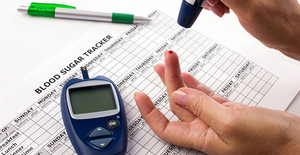Loading...
Found 20 Diabetes Mellitus, Type 2 trials
A listing of Diabetes Mellitus, Type 2 medical research trials actively recruiting patient volunteers. Search for closest city to find more detailed information on a research study in your area.
OCPs increase the risk of MetS specifically by producing an atherogenic lipoprotein phenotype, increasing blood pressure and/ or body weight while metformin modestly decreases MetS risk by decreasing body weight and improving lipid phenotype. The combination of OCP and metformin (OCP, through lowering androgens, and metformin, through improvement in insulin …




Normal 0 false false false EN-US X-NONE X-NONE We are currently screening for this study, but all in-person visits are on hold until the COVID-19 virus state of emergency is lifted. The timing of food consumption is now recognized as a significant contributor to body weight regulation and metabolic functioning. …

The mechanisms underlying cystic fibrosis related diabetes (CFRD) pathophysiology must be better defined if care for people with CFRD is to be optimized or if development of CFRD is to be interrupted. Detailed studies of insulin secretion in CF are required to achieve this goal since 1) subtle insulin secretion …

Weight loss can result from a decrease in body fluid, muscle mass, or fat. A decrease in body fluid can come from medications, fluid loss, lack of fluid intake, or illnesses such as diabetes. A decrease in body fat can be intentionally caused by exercise and dieting, such as for overweight or obesity.

The purpose of this study is to find out if a drug called dapagliflozin would be effective in improving the blood tests and symptoms related to your heart failure.

The hypoglossal nerve controls tongue movement. The Inspire® sleep implant works by stimulating this nerve. This process is called hypoglossal nerve stimulation, or “HGNS.” In this study, we are interested in seeing how HGNS affects blood pressure and heart-related measures and if it lowers the risk of heart problems in …

The research study is being done to look at the effect of sleep apnea surgery on different measures ofcardiovascular (heart) function in people with obstructive sleep apnea.